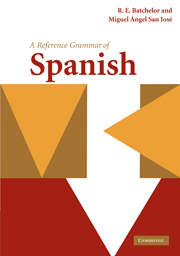Book contents
- Frontmatter
- Contents
- Preface/Prólogo
- Acknowledgments/Agradecimientos
- Abbreviations/Abreviaturas
- Introduction to the Spanish language/Introducción a la lengua española
- Part I
- Part II
- Part III
- Part IV
- Part V
- Part VI
- Part VII
- Part VIII
- Part IX
- Part X
- 76 Names of countries, regions, US states, continents, oceans, rivers, mountains, volcanoes/Nombres de países, regiones, estados de los EE.UU., continentes, océanos, ríos, montañas, volcanes
- 77 Proper names/Nombres propios
- 78 Foreign and indigenous words/Palabras extranjeras e indígenas
- 79 Incorrect use of “la”/“le”/“lo”/Uso incorrecto de “la”/“le”/“lo” (laísmo, leísmo, loísmo)
- 80 Incorrect use of “de” and “que”/Uso incorrecto de “de” y “que” (dequeísmo, queísmo)
- Appendix I Verb tables/ Tablas de verbos
- Appendix II Glossary/Glosario
- Bibliography/Bibliografía
- General index/Índice general
- Subjunctive index/Índice del subjuntivo
77 - Proper names/Nombres propios
from Part X
Published online by Cambridge University Press: 05 June 2012
- Frontmatter
- Contents
- Preface/Prólogo
- Acknowledgments/Agradecimientos
- Abbreviations/Abreviaturas
- Introduction to the Spanish language/Introducción a la lengua española
- Part I
- Part II
- Part III
- Part IV
- Part V
- Part VI
- Part VII
- Part VIII
- Part IX
- Part X
- 76 Names of countries, regions, US states, continents, oceans, rivers, mountains, volcanoes/Nombres de países, regiones, estados de los EE.UU., continentes, océanos, ríos, montañas, volcanes
- 77 Proper names/Nombres propios
- 78 Foreign and indigenous words/Palabras extranjeras e indígenas
- 79 Incorrect use of “la”/“le”/“lo”/Uso incorrecto de “la”/“le”/“lo” (laísmo, leísmo, loísmo)
- 80 Incorrect use of “de” and “que”/Uso incorrecto de “de” y “que” (dequeísmo, queísmo)
- Appendix I Verb tables/ Tablas de verbos
- Appendix II Glossary/Glosario
- Bibliography/Bibliografía
- General index/Índice general
- Subjunctive index/Índice del subjuntivo
Summary
Using proper names
Although there are Spanish equivalents for a number of English names (Peter = Pedro, John = Juan, Mary = María, Ana = Ana), the names of individuals are not translated from one language to another, for this would be meaningless. John Smith could be neatly translated as Juan Herrero, a name easily recognizable as Spanish, but this would not indicate John Smith. John Smith remains John Smith; likewise, Juan Herrero remains Juan Herrero. The names of famous or notorious historical personages often have a peculiar Spanish form. Although this does not apply to English names, Latin, Greek and Italian names are particularly affected. There are also special Spanish forms for modern Russian names, as well as historical ones. The English appears after the Spanish below only if the name is not entirely clear.
The ancient Greek world
Alejandro (Magno) (Alexander [the Great], Aquiles (Achilles), Ariana (Ariadne), Aristófanes, Aristóteles, Arquímedes, Edipo (Oedipus), Esopo (Aesop), Esquilo (Aeschylus), Euclides, Eurípides, Homero, Ilíada, Odisea, Jenofonte (Xenophon), Leandro (Leander), Narciso, Pitágoras, Platón (Plato)
The ancient Roman world
Adriano (Hadrian), Aníbal (Hannibal), Augusto, Cartago (Carthage), Catón (Cato), (Julio) César, Cicerón (Cicero), Escipión (Scipio), Horacio (Horace), Marco Antonio (Mark Antony), Marco Aurelio (Marcus Aurelius), Nerón (Nero), Ovidio (Ovid), Plinio (Pliny), Tito Livio (Livy)
The Bible
Old Testament: Adán (Adam), Baltasar (Belshazzar), Dalila (Delilah), Isaías, Jehová, Jonás, Josué (Joshua), Matusalén (Methuselah), Moisés, Nabucodonosor (Nebuchadnezzar), Noé (Noah), Rut (Ruth), Saba (Sheba), Saúl (Saul; note that the New Testament Saul, later Paul [Pablo], is Saulo)
- Type
- Chapter
- Information
- A Reference Grammar of Spanish , pp. 467 - 468Publisher: Cambridge University PressPrint publication year: 2010

